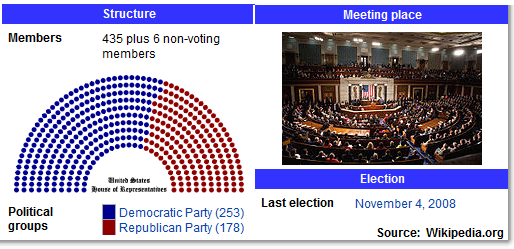Recent Reports Show Republicans Very Likely to Capture House in November
If you incorporate any type of political forecasting into your investment or trading decisions, now might be the time to start thinking about the make-up of Congress when the United States votes in November – recent commentary and analysis reports show there could be big changes that you need to be factoring into your decision-making process.
A quick primer – the US House of Representatives is a 435 member body where all Representatives are up for re-election every two years – 2010 being a “Mid-Term” election year.

Currently, Democrats hold 253 seats while Republicans hold 178 seats – a majority is 218 seats – the Majority Party elects the Speaker of the House and essentially controls the conduct of business.
The Senate is a 100-member body where each state sends two Senators to Congress, and Democrats effectively (with two independents) hold a 59 to 41 seat majority.
For a bill to pass Congress and become law, it must pass – in identical form – both the House and the Senate and then be signed by the President.
So why do you need to know what is likely to happen in November and how it might affect the market?
Because a string of recent reports show that Republicans are increasingly likely to sweep many of the contests in November and beat enough incumbent Democrats so as to recapture the majority in the House.
If that were the case, then the US Government would enter a period of “Gridlock” similar to that of the 1994 – 2001 period where a Democratic President must negotiate with a Republican Congress (or at least one House with a majority of Republicans) to get a Bill to become Law.
That means that the President must enact more moderate legislation, compromising with Republicans, or no further legislation will be passed as bills supported by Democrats will be blocked in the House by Republicans.
What it all means is really beyond the scope of this post, but it is a big deal that you should know is an increasing likelihood that will affect future legislation and have an effect on the stock market.
Here are some of the recent reports that are worth a read if you are interested:
“A Forecast of the 2010 House Election Outcome”
Quick Quotes:
“To answer this question (who will win the House) we have run 1,000 simulations of the 2010 House elections…. Our current forecast for 2010 shows that the Republicans are likely to regain the House majority.”
“By our reckoning, the most likely scenario is a Republican majority in the neighborhood of 229 seats versus 206 for the Democrats for a 50-seat loss for the Democrats. Taking into account the uncertainty in our model, the Republicans have a 79% chance of winning the House.”
Other recent reports:
New York Times House Races Reference Page Link (here).
“39 Seats Away, Republicans Hungry to Take Back the House” – The Atlantic
“New Forecast Shows Democrats Losing 6 or 7 Senate Seats” – FiveThirtyEight
(As of today, it looks like the Democrats will hold on very slightly to the Majority in the Senate, maybe ending November with an incoming 52 or 53 seat Majority – down from 59 currently).
And for those of us who like betting odds, InTrade (which was very useful in many 2008 election forecasts) currently shows the odds for a Republican take-over of the House to be 77%.

The November elections are just over three months away, so the standard disclaimer “Anything Can Happen” certainly applies, but it’s my experience in projecting/forecasting political races that trends tend to take hold and build momentum, and things don’t change much (barring a major shock) between the start of Fall and the November elections.
Start thinking now about how this might affect legislation and its impact on the financial markets – as in, political stalemate and stagnation with no major legislation passing from 2011 – 2013 without major compromises – 2013 is when a new (or current) President will take office as will a new (or old) Congress.
The stalemate and compromise seemed to work well from 1995 until 2001 – will history repeat if the Republicans do take the House majority in November (technically in January 2011)?
Corey Rosenbloom, CMT
Afraid to Trade.com
Follow Corey on Twitter: http://twitter.com/afraidtotrade

“For a bill to pass Congress and become law, it must pass – in identical form – both the House and the Senate and then be signed by the President.”
Except for ObomaCare
Maybe I should add “According to the Constitution….”
But that sort of underscores the point – if Republicans do capture the House, there will be no possibility for Obama to pass major legislation like that.